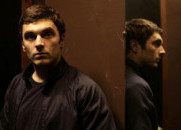Alex ekes out a living as a small-time drug dealer in Paris. He’s 27 and single but any chance he has of ever having a happy existence is scuppered by his walking disaster of an older brother Isaac who he is constantly bailing out for the substantial debts he has somehow amassed with some criminals, or he is lying to cover up his extra-marital affairs.
To raise the money Alex raises the stakes and starts selling hard drugs, but as rapidly as he manages to do that, then his brother gets more desperate and demanding and when Alex doesn’t give him everything, Isaac breaks into his apartment and robs him.
At the same time Alex gets smitten with Jeanne, a gentile that he met through his ex-girlfriend. There is an obvious attraction between the two, and as the relationship between them develops, it puts into question Alex’s planned move. When she inadvertently lets Isaac know that his brother is planning to leave , the aliyah looks even more unlikely. Alex knows that that in order to finally relinquish all responsibility for his brother, the price is that he must also let Jeanne go. But can he?
This rather wonderful feature movie from newbie French director Elie Wajeman which debuted at the Cannes Film Festival is a fascinating story about the whole concept of making aliyah. Once Alex decides that this is the path he wants to take, we see him go through the whole process of determining his heritage (‘if you can’t find your parents papers, you will probably get accepted just because of their family names’) learning Hebrew, and giving interviews when he assures them that he will not join the army.
We never learn why his brother Isaac is in such a mess as the story focuses on Alex and his steadfast loyalty to him which stems from the fact that their widower father has abandoned them and that Alex has for some reason assumed all the responsibility for his family. It’s an intriguing relationship, as is the one between Alex and Jeanne and makes this slow-burning drama totally riveting.
None more so than because of the mesmerizing performance of Pio Marmaï (‘The First Day of the Rest of Your Life’) as Alex : he is the main reason that this movie works as well as it does. His irritating brother is played by film auteur Cedric Kahn (‘Red Lights’) stepping in front of the camera for a change and showing what a fine actor he is too.
The very best scene in the movie is towards its conclusion when Jeanne and Alex are sitting in a cafe and she starts to map out their lives on a napkin. Its both funny and touching. It also shows that there is hope, although not as they both would have preferred.




